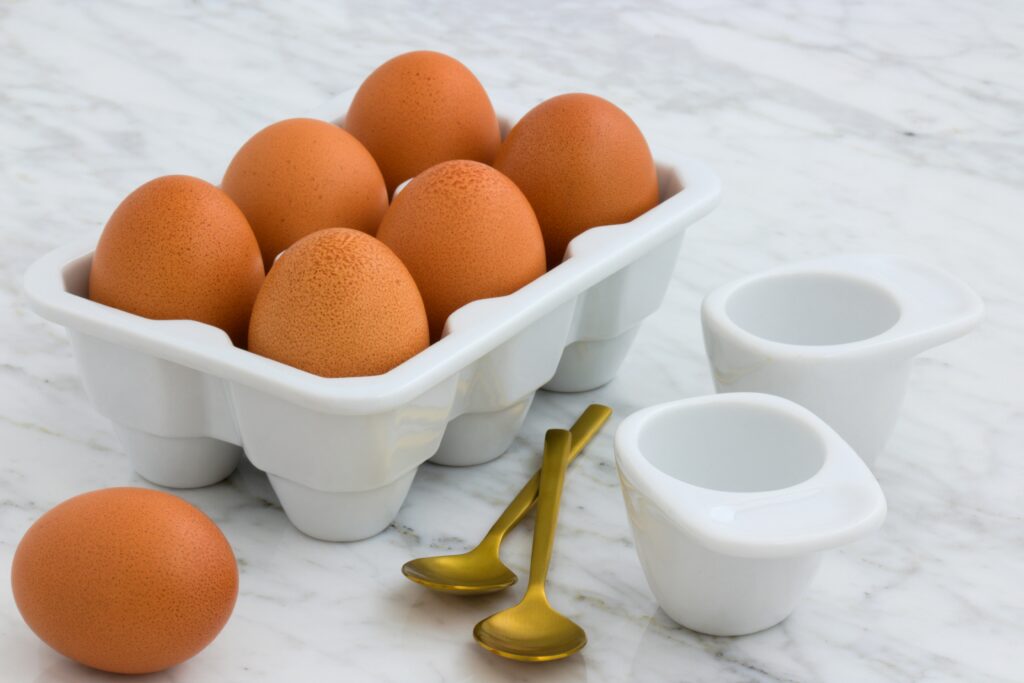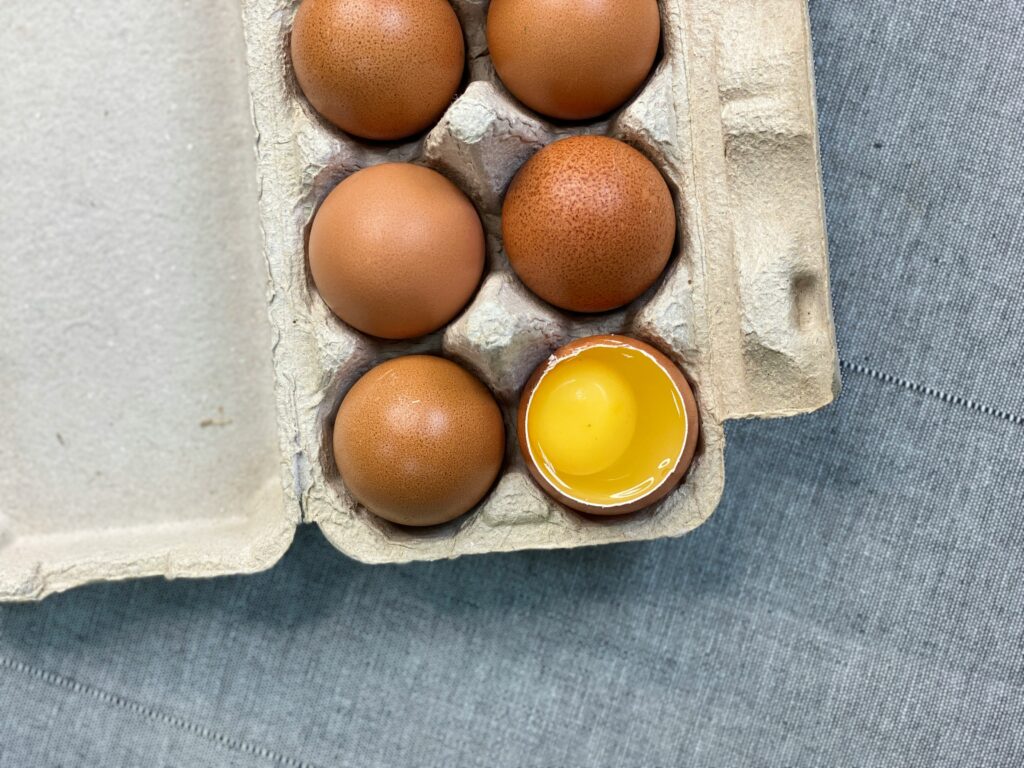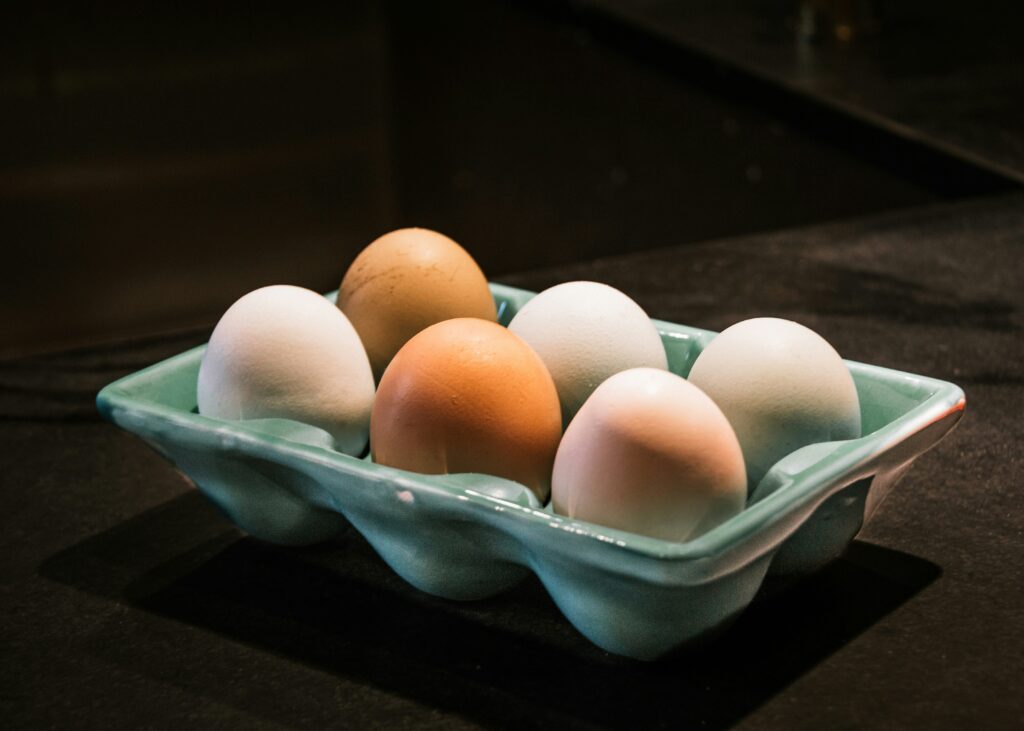Understanding Egg Freshness: The Basics
Before diving into how long fresh eggs last on the counter, it’s essential to understand what defines an egg’s freshness. Fresh chicken eggs are typically laid with a natural coating called the “bloom” or “cuticle,” which helps seal the eggshell’s pores and protects the inside from bacteria. This invisible layer is key to understanding why eggs can stay unrefrigerated for extended periods under the right conditions.
Egg freshness isn’t just about the date they were laid—it’s influenced by how they’re handled, cleaned, and stored. For instance, unwashed eggs from backyard chickens or farmers’ markets often retain their bloom, extending their shelf life outside the fridge.
On the other hand, store-bought eggs in the U.S. are washed and sanitized to meet USDA standards, which removes the bloom and reduces their natural protection—making refrigeration a must.
Understanding this distinction is crucial when determining how long eggs can safely sit on the counter without going bad or posing health risks.

Photo by Lai YuChing on Unsplash
Why Fresh Eggs Don’t Always Need Refrigeration
In many parts of the world—Europe, for example—eggs are commonly stored at room temperature. Why? Because eggs that haven’t been commercially washed retain their bloom, which acts as a natural barrier to bacteria.
Bloom Protection: Nature’s Seal
The bloom is nature’s way of protecting a developing chick from external contaminants. It effectively seals the egg from bacterial entry, particularly salmonella, which is a major concern with egg consumption. When left intact, this coating allows the egg to stay fresh for weeks outside refrigeration—especially in a cool, dry environment.
Washed vs. Unwashed Eggs
Let’s break this down:
| Egg Type | Washed | Bloom Present | Shelf Life on Counter |
| Store-Bought (U.S.) | Yes | No | 2 hours to 1 day max |
| Farm-Fresh | No | Yes | 2–3 weeks |
Once washed, even farm-fresh eggs lose this advantage and should be refrigerated just like commercial ones. Always ask your local farmer or supplier if the eggs have been washed.
How Long Can Fresh Eggs Sit on the Counter?
The golden question—how many days is “safe”?
Room Temperature Guidelines
Fresh, unwashed chicken eggs can typically sit on the counter for up to 2–3 weeks without spoiling, provided your home stays at 65–75°F (18–24°C). Higher temperatures can accelerate spoilage, while cooler conditions preserve freshness.
Factors That Affect Egg Shelf Life
Several variables influence how long your eggs stay fresh:
- Ambient temperature: Hotter climates = faster spoilage.
- Humidity: Too much moisture can promote mold or bacteria.
- Exposure to sunlight: Can alter the internal temperature and degrade nutrients.
- Eggshell integrity: Cracks allow bacteria to penetrate quickly.
Proper storage, such as using a ceramic bowl with a towel over it, can help extend freshness naturally.
How to Tell if Your Eggs Are Still Good
Wondering if that egg on the counter is still edible? Don’t worry—there are a few easy tests.
The Water Test Explained
This old-school method is both simple and surprisingly accurate:
- Fill a glass or bowl with cold water.
- Gently place the egg in the water.
| Egg Behavior | Meaning |
| Sinks and lays flat | Very fresh |
| Sinks, but stands | A bit older, still okay |
| Floats | Bad – toss it |
Visual and Smell Check
Crack the egg into a clean bowl:
- Look for: Cloudy whites (good), pink tinge or discoloration (bad).
- Smell test: A sulfur-like odor is a red flag—discard immediately.
These methods are excellent backups to ensure egg safety even after weeks on the counter.

Photo by Estudio Gourmet on Unsplash
Storing Farm-Fresh Eggs vs. Store-Bought Eggs
There’s a big difference between how you should store farm-fresh eggs and store-bought ones—and it comes down to whether or not they’ve been washed and processed.
Best Storage Practices for Farm Eggs
Farm-fresh eggs, especially those laid by backyard chickens or purchased from local markets, often retain the protective bloom. If these eggs are unwashed, you can store them on the counter for up to 21 days safely.
To maximize shelf life:
- Store in a cool, dry place out of direct sunlight.
- Use a ceramic bowl, egg basket, or a wooden tray for airflow.
- Keep the pointy side down to prevent the air sac from shifting.
If you’re in a hotter climate or your indoor temps rise above 75°F, it’s safer to refrigerate them after a few days to avoid bacterial growth.
When to Refrigerate Store-Bought Eggs
Store-bought eggs in the U.S. are cleaned using sanitizing solutions that strip away the natural bloom. Because of this:
- They must be refrigerated immediately after purchase.
- Leaving them at room temperature for over 2 hours increases the risk of spoilage or salmonella growth.
- Store in the main body of the fridge, not the door, where temps fluctuate more.
Eggs kept cold and consistently stored can last up to 5 weeks past the packing date if uncracked.
Health and Safety Tips for Counter-Stored Eggs
Keeping eggs at room temperature isn’t inherently unsafe—if you know what you’re doing. But for specific groups, a more cautious approach is recommended.
Who Should Avoid Counter Storage?
Those with weakened immune systems, including:
- Elderly adults
- Pregnant women
- Children under 5
- Immunocompromised individuals
These individuals are more vulnerable to salmonella infections, and even a small bacterial presence could pose a health risk. For them, refrigeration is the safer option.
Reducing the Risk of Salmonella
While salmonella isn’t common in backyard eggs, prevention matters:
- Never consume raw or undercooked eggs.
- Sanitize surfaces where eggs are handled.
- Don’t store cracked eggs on the counter—refrigerate or discard them.
- Wash your hands after handling raw eggs or eggshells.
For more safety information, consult the USDA’s egg safety page for guidelines on proper handling and storage.
Benefits of Storing Eggs at Room Temperature
For those who bake, cook frequently, or raise their own chickens, room temperature egg storage can offer surprising perks.
Culinary Advantages
Room temp eggs:
- Whip up better for baking (especially in meringues or sponge cakes).
- Create more stable emulsions for sauces like mayo or hollandaise.
- Cook more evenly and are less likely to crack in boiling water.
That’s why chefs often request eggs be left out before prep.
Sustainability and Convenience
- Reduces energy use by skipping refrigeration.
- Frees up fridge space for perishable items that truly need it.
- Supports zero-waste practices in small farms and homesteads.
- Simplifies farm-to-table living by allowing direct-from-coop consumption.
For homesteaders or families with a steady egg supply, room-temp storage is often more practical—and perfectly safe when done right.

Common Myths About Egg Storage Debunked
There’s a lot of misinformation floating around about how to store eggs. Let’s clear up the confusion.
Myth: Cold Eggs Are Always Safer
Not necessarily.
Cold storage is necessary for washed eggs (like commercial ones), but unwashed farm eggs can stay fresh for weeks on the counter without any safety concerns—provided they’re handled properly.
The real risk is cross-contamination, not temperature alone.
Myth: Eggs Expire Quickly Without Refrigeration
Again, context matters.
Unwashed eggs stored below 75°F can stay fresh for 2–3 weeks. In contrast, an egg that’s already old (more than a week after laying) will degrade faster, even if refrigerated.
The key is knowing the lay date and monitoring storage conditions.
Frequently Asked Questions (FAQs)
Can you leave eggs out overnight?
Yes—if they’re unwashed farm-fresh eggs, they can safely sit out overnight and for up to 2–3 weeks, assuming the room temperature stays under 75°F. Washed or store-bought eggs, however, should never be left out for more than 2 hours.
Are unwashed eggs safe to eat?
Absolutely. In fact, unwashed eggs with their bloom intact are better protected from bacteria. Just make sure they come from healthy hens and are stored properly.
What’s the maximum number of days fresh eggs last on the counter?
On average, 14 to 21 days is safe for unwashed, farm-fresh eggs. After that, they should either be consumed or refrigerated to extend their life.
Do farm eggs and store eggs last the same amount of time?
No. Store eggs are washed, which shortens their shelf life outside the fridge. Farm eggs can last longer at room temperature because they still have the bloom intact.
Can you refrigerate eggs after leaving them out?
Yes, but only if they haven’t been exposed to high heat or left out for more than a few days. If in doubt, crack one open and do a visual/smell check or try the float test.
Do backyard chickens lay safer eggs?
They can—if the chickens are healthy and live in clean conditions. Many people prefer backyard eggs because they’re fresher and more likely to be unwashed, which means a longer counter life.

Photo by Ryan ODee on Unsplash
Conclusion: Keep Your Eggs Fresh, Naturally
So, how long do fresh chicken eggs last on the counter? If they’re unwashed and stored in cool, dry conditions, they can last up to 3 weeks with no issue. However, once eggs are washed—or if they’re store-bought—refrigeration becomes essential.
Understanding the difference between commercial and farm-fresh eggs is the key to safe storage. By leveraging nature’s design (the bloom) and following proven storage tips, you can enjoy fresher eggs, reduce food waste, and simplify your kitchen routine.
Whether you’re a homesteader, a backyard chicken keeper, or a conscious consumer, proper egg handling practices help you make the most of this versatile kitchen staple—naturally and safely.
